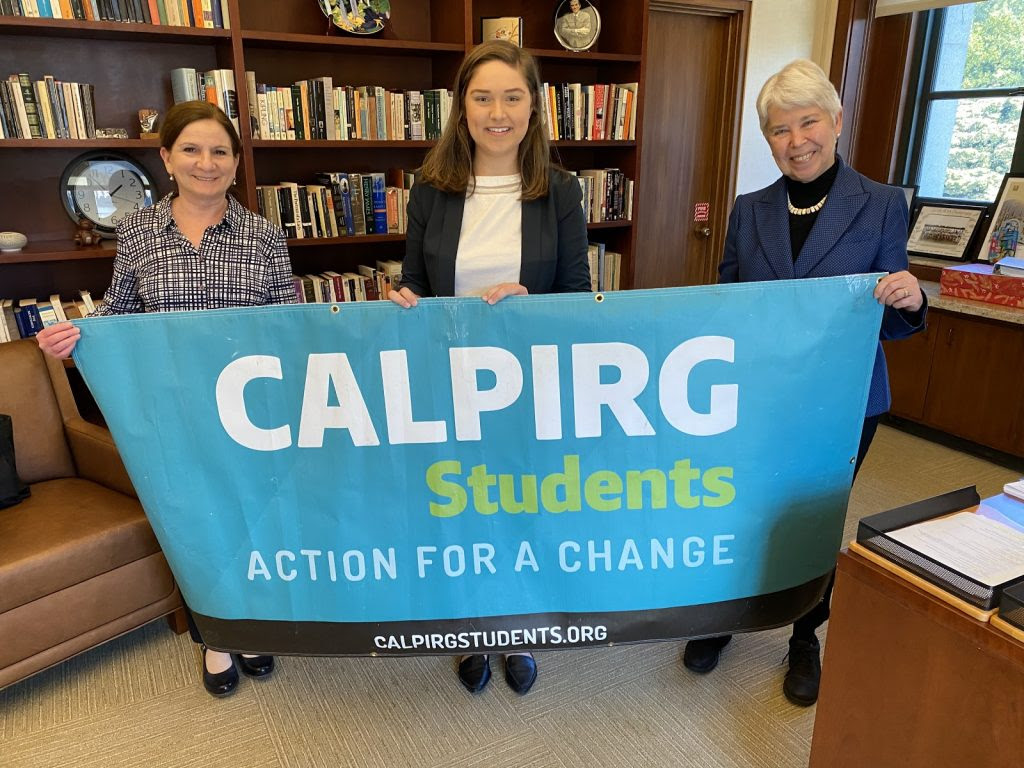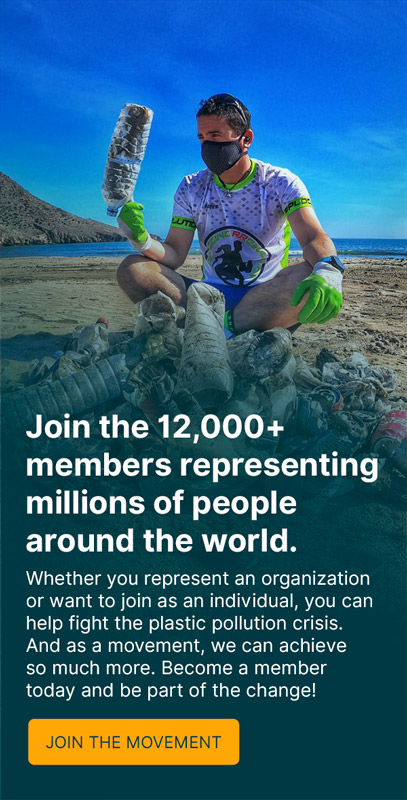Campus commits to an unprecedented, comprehensive plastic policy, which eliminates all non-essential single-use plastic by 2030
Press Release April 16, 2020 | CALPIRG Student
BERKELEY, Calif. — The University of California, Berkeley has committed to eliminating all non-essential single-use plastic with viable alternatives by 2030. This target, adopted by Chancellor Carol Christ, makes history by being the most comprehensive ban of plastic by an institution and the country’s strongest ban on single-use plastic. Unlike other plastic bans, UC Berkeley’s initiative goes beyond previously existing plastic reduction targets focused on foodware and plastic bags, and addresses the spectrum of products and packaging used in campus academics, research, administration, and events.
“UC Berkeley is truly leading the way on this effort,” said Nicole Haynes, a senior at UC Berkeley, who is the CALPIRG Chapter Chair and Plastic-Free Seas Coordinator. “We have passed the point where we should be banning plastic one-by-one through bag, bottle, and takeout container bans. Studies continue to show us how much of a detriment plastic is to our environment and public health, so we need commitments like this that will tackle the bulk of plastic products and packaging.”
This first-of-a-kind commitment will be instrumental in paving the way for a plastic-free future. UC Berkeley is the number one public university in the country, and with its mission of teaching, research, and public service it is well positioned to find innovative solutions, not just for the campus but globally. By leading with the strongest plastic elimination commitment in the nation, the campus cements its status as a leader in sustainability as well. Other colleges, cities, and companies can look to UC Berkeley’s leadership and join the movement to stop plastic pollution and waste, protecting our oceans and our public health.
“We are proud and excited for UC Berkeley to be the first university campus to commit to eliminating all of its non-essential single-use plastics,” said UC Berkeley Chancellor Carol Christ. “This ambitious goal will spur change on our campus as well as in our supply chain, and will have a positive effect on both the environment and public health.”
CALPIRG Students started a campaign in the fall of 2019 to get UC Berkeley to take action to address the severe ecological, health, and environmental justice impact that single-use plastic waste has globally. CALPIRG’s Plastic-Free Seas Campaign built support on the campus from residence hall dining, catering, concessions, independent cafes, the campus bookstore, retailers including the campus Amazon Store, and athletics. Student government unanimously passed a resolution in support securing over fifty student leader sign-ons.
Key to this target adoption was the support from Vice Chancellors and Deans including the Vice Chancellor for Research, Randy Katz, “We are committed to making our campus research enterprise as safe and sustainable as possible, and view the elimination of single-use plastic, where and when we can, as an important goal.”
CALPIRG’s Plastic-Free Seas Campaign worked closely with many campus stakeholders to develop a well structured and motivating policy. It passed unanimously through the Chancellor’s Advisory Committee on Sustainability on March 10 and was endorsed by Chancellor Christ on March 12.
“It is possible to phase out single use non-essential plastic, if we pursue and create environmentally sound alternatives and reduce so much of the unnecessary packaging,” said Kira Stoll, UC Berkeley’s Chief Sustainability & Carbon Solutions Officer. “Through continued engagement with our students, staff, faculty, partners, and campus leaders and by taking strategic action we can help solve the problem of plastic pollution and its sizable carbon footprint in the next decade.”
Some alternatives for products that this policy will tackle have not been created yet, but over the next decade, packaging and products may look very different. Back-of-the-house food service and lab research are among the most challenging areas for the evolution of plastic policies. “As a large institution, UC Berkeley has impressive purchasing power and a reputation as an innovator,” offered Marc Fisher, Vice Chancellor, Administration. “UC Berkeley spends a quarter of a billion dollars each year on goods for its campus operations, so asking our vendors to work with us and re-tool and develop alternatives to single-use plastic can drive valuable global upstream solutions.”
This commitment will aid UC Berkeley in achieving its zero waste goals as over a quarter of UC Berkeley’s waste is from non-recyclable plastics. This policy will eliminate a large portion of non-recyclable plastic as well as “recyclable” plastic, which is extremely important since that is often not fully recycled and still presents a major problem.
UC Berkeley has been leading in zero waste efforts as the first UC campus to adopt the City of Berkeley’s progressive Foodware Ordinance components such as all to-go food in compostable containers and “accessory” foodware upon request.
As first steps, the campus will also form a Single-Use Plastic Working Group made up of diverse stakeholders, develop enabling strategies in purchasing contracts, and develop a plan – a roadmap – to the 2030 target.
“The UC Berkeley Single Use Elimination Policy exemplifies our university’s leadership of being a solution to our worldwide plastics pollution problem,” said Lin King, UC Berkeley’s Zero Waste Manager. “This policy is a necessary and critical tool in supporting our campus zero waste 2020 and beyond goals as plastics is one of our most challenging materials to recycle or divert. One of our main focuses in implementing this policy will be to partner with faculty, staff, students, organizations and companies to research alternatives and develop circular economy solutions for plastics.”



